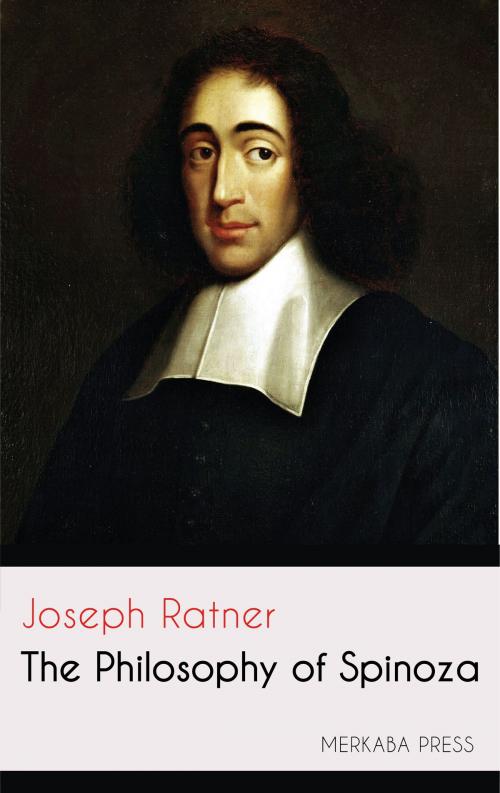| Author: | Joseph Ratner | ISBN: | 6610000027309 |
| Publisher: | PublishDrive | Publication: | August 8, 2017 |
| Imprint: | Merkaba Press | Language: | English |
| Author: | Joseph Ratner |
| ISBN: | 6610000027309 |
| Publisher: | PublishDrive |
| Publication: | August 8, 2017 |
| Imprint: | Merkaba Press |
| Language: | English |
Baruch de Spinoza was born into the Jewish community of Amsterdam on November 24, 1632. His parents were Jews who had fled, along with many others, from the vicious intolerance of the Inquisition to the limited and hesitant freedom of Holland. At the time Spinoza was born, the Jewish refugees had already established themselves to a certain extent in their new home. They had won, for example, the important right to build a synagogue. Still, they did not enjoy the complete freedom and peace of mind of an independent and securely protected people. Although one could be a Jew in Amsterdam, one had to be a Jew with considerable circumspection. Whatever might prove in any way offensive to the political authority had to be scrupulously eschewed. For, as is always the case, minority groups which are simply tolerated have to suffer for the offenses of any of their members. The Jews of Amsterdam thoroughly understood this. They knew that any significant default on the part of one member of their community would not, in all likelihood, be considered by the authorities to be a default of that one person alone—a failing quite in the order of human nature; they knew it would be considered a manifestation of an essential vice characteristic of the whole community. And the whole community would have to suffer, in consequence, an exaggerated punishment which the individual delinquent himself may well not merit.
It was inevitable that the intellectual life of the Jews of Amsterdam should bear the marks of their inner and outer social constraints. Their intellectual life was cramped and ineffectual. Indiscriminate erudition, not independent thought, was all the Jewish leaders, connected in one way or another with the Synagogue, were able to achieve. It was far safer to cling to the innocuous past than it was to strike out boldly into the future. Any independence of thought that was likely to prove socially dangerous as well as schismatic was promptly suppressed. The humiliation and excommunication (circa 1640) of the indecisive martyr Uriel da Costa when he ventured to entertain doctrines that were not orthodox, were prompted as much by political as by religious considerations. It is true, many of the faithful were attracted by Cabbalistic wonders and the strange hope of being saved from a bitter exile by a Messianic Sabbatai Zevi. But these wayward deviations, in reality not so very far removed from orthodox tradition, exhibited only the more clearly the fearsome inner insecurity which a strained formalism in thought and habit bravely attempted to cover.
Baruch de Spinoza was born into the Jewish community of Amsterdam on November 24, 1632. His parents were Jews who had fled, along with many others, from the vicious intolerance of the Inquisition to the limited and hesitant freedom of Holland. At the time Spinoza was born, the Jewish refugees had already established themselves to a certain extent in their new home. They had won, for example, the important right to build a synagogue. Still, they did not enjoy the complete freedom and peace of mind of an independent and securely protected people. Although one could be a Jew in Amsterdam, one had to be a Jew with considerable circumspection. Whatever might prove in any way offensive to the political authority had to be scrupulously eschewed. For, as is always the case, minority groups which are simply tolerated have to suffer for the offenses of any of their members. The Jews of Amsterdam thoroughly understood this. They knew that any significant default on the part of one member of their community would not, in all likelihood, be considered by the authorities to be a default of that one person alone—a failing quite in the order of human nature; they knew it would be considered a manifestation of an essential vice characteristic of the whole community. And the whole community would have to suffer, in consequence, an exaggerated punishment which the individual delinquent himself may well not merit.
It was inevitable that the intellectual life of the Jews of Amsterdam should bear the marks of their inner and outer social constraints. Their intellectual life was cramped and ineffectual. Indiscriminate erudition, not independent thought, was all the Jewish leaders, connected in one way or another with the Synagogue, were able to achieve. It was far safer to cling to the innocuous past than it was to strike out boldly into the future. Any independence of thought that was likely to prove socially dangerous as well as schismatic was promptly suppressed. The humiliation and excommunication (circa 1640) of the indecisive martyr Uriel da Costa when he ventured to entertain doctrines that were not orthodox, were prompted as much by political as by religious considerations. It is true, many of the faithful were attracted by Cabbalistic wonders and the strange hope of being saved from a bitter exile by a Messianic Sabbatai Zevi. But these wayward deviations, in reality not so very far removed from orthodox tradition, exhibited only the more clearly the fearsome inner insecurity which a strained formalism in thought and habit bravely attempted to cover.















